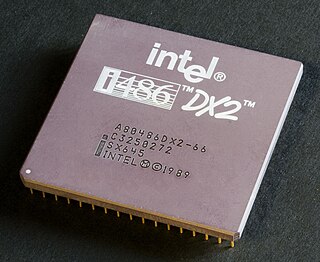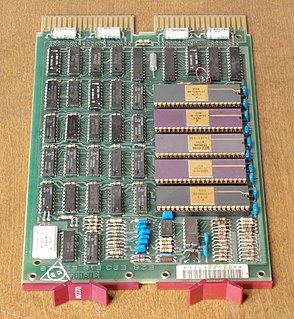
In mathematics and computer science, an algorithm is an unambiguous specification of how to solve a class of problems. Algorithms can perform calculation, data processing, automated reasoning, and other tasks.

Computing is any activity that uses computers. It includes developing hardware and software, and using computers to manage and process information, communicate and entertain. Computing is a critically important, integral component of modern industrial technology. Major computing disciplines include computer engineering, software engineering, computer science, information systems, and information technology.

A central processing unit (CPU), also called a central processor or main processor, is the electronic circuitry within a computer that carries out the instructions of a computer program by performing the basic arithmetic, logic, controlling, and input/output (I/O) operations specified by the instructions. The computer industry has used the term "central processing unit" at least since the early 1960s. Traditionally, the term "CPU" refers to a processor, more specifically to its processing unit and control unit (CU), distinguishing these core elements of a computer from external components such as main memory and I/O circuitry.

Computer science is the study of processes that interact with data and that can be represented as data in the form of programs. It enables the use of algorithms to manipulate, store, and communicate digital information. A computer scientist studies the theory of computation and the practice of designing software systems.

A computer program is a collection of instructions that performs a specific task when executed by a computer. A computer requires programs to function.

A computer worm is a standalone malware computer program that replicates itself in order to spread to other computers. Often, it uses a computer network to spread itself, relying on security failures on the target computer to access it. Worms almost always cause at least some harm to the network, even if only by consuming bandwidth, whereas viruses almost always corrupt or modify files on a targeted computer.

Machine code is a computer program written in machine language instructions that can be executed directly by a computer's central processing unit (CPU). Each instruction causes the CPU to perform a very specific task, such as a load, a store, a jump, or an ALU operation on one or more units of data in CPU registers or memory.

A Turing machine is a mathematical model of computation that defines an abstract machine, which manipulates symbols on a strip of tape according to a table of rules. Despite the model's simplicity, given any computer algorithm, a Turing machine capable of simulating that algorithm's logic can be constructed.
In computability theory, a system of data-manipulation rules is said to be Turing complete or computationally universal if it can be used to simulate any Turing machine. This means that this system is able to recognize or decide other data-manipulation rule sets. Turing completeness is used as a way to express the power of such data-manipulation rule set. The expression power of these grammars is captured in the Chomsky hierarchy. Virtually all programming languages today are Turing Complete. The concept is named after English mathematician and computer scientist Alan Turing.

Parallel computing is a type of computation in which many calculations or the execution of processes are carried out simultaneously. Large problems can often be divided into smaller ones, which can then be solved at the same time. There are several different forms of parallel computing: bit-level, instruction-level, data, and task parallelism. Parallelism has long been employed in high-performance computing, but it's gaining broader interest due to the physical constraints preventing frequency scaling. As power consumption by computers has become a concern in recent years, parallel computing has become the dominant paradigm in computer architecture, mainly in the form of multi-core processors.
A wait state is a delay experienced by a computer processor when accessing external memory or another device that is slow to respond.
Computer literacy is the ability to use computers and related technology efficiently, with a range of skills covering levels from elementary use to programming and advanced problem solving. By another measure, computer literacy requires some understanding of computer programming and how computers work.
The history of computer science began long before our modern discipline of computer science usually appearing in forms like mathematics or physics. Developments in previous centuries alluded to the discipline that we now know as computer science. This progression, from mechanical inventions and mathematical theories towards modern computer concepts and machines, led to the development of a major academic field, massive technological advancement across Western Society, and the basis of a massive worldwide trade and culture.
In re: Sealed Case No. 02-001, 310 F.3d 717 (2002), is a per curiam decision by the United States Foreign Intelligence Surveillance Court of Review in which it reviewed restrictions that were placed upon a Foreign Intelligence Surveillance Act (FISA) application by the Foreign Intelligence Surveillance Court (FISC) on May 17, 2002. The Court of Review reversed the FISC's restrictions, stating that they "are not required by FISA or the Constitution". This opinion represents the first meeting of and first opinion by the Court of Review. For the purposes of review, the FISC's modification of the requested application worked as a "denial", thus giving the Court of Review jurisdiction to take the case.
A computer is a device that can be instructed to carry out sequences of arithmetic or logical operations automatically via computer programming. Modern computers have the ability to follow generalized sets of operations, called programs. These programs enable computers to perform an extremely wide range of tasks. A "complete" computer including the hardware, the operating system, and peripheral equipment required and used for "full" operation can be referred to as a computer system. This term may as well be used for a group of computers that are connected and work together, in particular a computer network or computer cluster.

The TOP500 project ranks and details the 500 most powerful non-distributed computer systems in the world. The project was started in 1993 and publishes an updated list of the supercomputers twice a year. The first of these updates always coincides with the International Supercomputing Conference in June, and the second is presented at the ACM/IEEE Supercomputing Conference in November. The project aims to provide a reliable basis for tracking and detecting trends in high-performance computing and bases rankings on HPL, a portable implementation of the high-performance LINPACK benchmark written in Fortran for distributed-memory computers.

Computer hardware includes the physical, tangible parts or components of a computer, such as the cabinet, central processing unit, monitor, keyboard, computer data storage, graphics card, sound card, speakers and motherboard. By contrast, software is instructions that can be stored and run by hardware. Hardware is so-termed because it is "hard" or rigid with respect to changes or modifications; whereas software is "soft" because it is easy to update or change. Intermediate between software and hardware is "firmware", which is software that is strongly coupled to the particular hardware of a computer system and thus the most difficult to change but also among the most stable with respect to consistency of interface. The progression from levels of "hardness" to "softness" in computer systems parallels a progression of layers of abstraction in computing.
Claude M. Hilton is a Senior United States District Judge of the United States District Court for the Eastern District of Virginia.

In computer engineering, computer architecture is a set of rules and methods that describe the functionality, organization, and implementation of computer systems. Some definitions of architecture define it as describing the capabilities and programming model of a computer but not a particular implementation. In other definitions computer architecture involves instruction set architecture design, microarchitecture design, logic design, and implementation.
The following outline is provided as an overview of and topical guide to computing:













